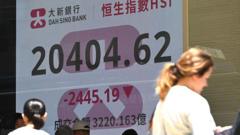Following the announcement of new tariffs by U.S. President Trump, Asian stock markets experienced sharp declines, with fears of a global trade war prompting a sell-off. The repercussions are especially pronounced in economies reliant on U.S. exports, with projections of potential recession looming over the global outlook.
Asian Markets Plummet Amid Fears of Trade War Fallout

Asian Markets Plummet Amid Fears of Trade War Fallout
The Asian stock markets faced their most significant decline in decades due to fears stemming from the new tariffs imposed by the U.S., impacting export-reliant economies across the region.
Empty line
Asian stock markets were caught in a dramatic downturn as fears of a brewing global trade war prompted widespread panic among investors. The impact of U.S. President Donald Trump's recent tariff announcements was felt sharply, with major indices from Shanghai to Tokyo and Sydney suffering losses not seen in decades. The Shanghai Composite saw a staggering drop of over 8% at one point, while the Hang Seng Index in Hong Kong plunged more than 13%. Japan's Nikkei 225 closed down by 7.8%, leading analysts to describe the scenario as a "bloodbath."
These significant losses follow the introduction of new tariffs by the U.S. ranging from 10% to 46% on imports from multiple countries, creating immediate instability for global market participants. As the manufacturing hubs of Asia brace for the fallout, the situation signifies a notable threat to export-driven economies like Japan and South Korea, which are facing tariffs of 26%. Developing nations, such as Vietnam, are faring even worse, with a proposed 46% tariff, severely jeopardizing their economic prospects as they've been characterized by Trump as "worst offenders.”
The ramifications extend beyond just losses in share prices; analysts warn that these tariffs could potentially trigger a recession, especially affecting the U.S. economy—regional analysts believe that this prospect could significantly dampen Asian exports. Following the announcement, the negative sentiment exacerbated in mainland China, Hong Kong, and Taiwan, with the Taiwan Weighted Index experiencing a historic 9.7% decline, marking its largest drop ever.
With Goldman Sachs now projecting a 45% likelihood of a U.S. recession in the coming year, investment banks are adjusting their forecasts downward. Other banks, such as JPMorgan, have signaled a dire caution by increasing recession probability estimates to 60%. Economists emphasize the disproportionate effect these tariffs will have on Asian nations, many of which currently rely heavily on the U.S. market for their exports.
Countries like Vietnam and Bangladesh, heavily reliant on U.S. markets, are poised for significant adversity. Major American brands like Nike produce products in Vietnam, while Bangladesh exports billions in garments to the U.S. A looming 37% tariff on Bangladeshi goods threatens to destabilize a sector vital to the nation’s economy.
Overall, analysts predict that Asia will face the brunt of this trade tumult due to its dependent trade relationships with the U.S. This outlook is compounded by China's retaliatory tariffs, amplifying the global market volatility. The situation remains fluid, with global markets already losing trillions in value, as traders prepare for continued turbulence in the days ahead.
Asian stock markets were caught in a dramatic downturn as fears of a brewing global trade war prompted widespread panic among investors. The impact of U.S. President Donald Trump's recent tariff announcements was felt sharply, with major indices from Shanghai to Tokyo and Sydney suffering losses not seen in decades. The Shanghai Composite saw a staggering drop of over 8% at one point, while the Hang Seng Index in Hong Kong plunged more than 13%. Japan's Nikkei 225 closed down by 7.8%, leading analysts to describe the scenario as a "bloodbath."
These significant losses follow the introduction of new tariffs by the U.S. ranging from 10% to 46% on imports from multiple countries, creating immediate instability for global market participants. As the manufacturing hubs of Asia brace for the fallout, the situation signifies a notable threat to export-driven economies like Japan and South Korea, which are facing tariffs of 26%. Developing nations, such as Vietnam, are faring even worse, with a proposed 46% tariff, severely jeopardizing their economic prospects as they've been characterized by Trump as "worst offenders.”
The ramifications extend beyond just losses in share prices; analysts warn that these tariffs could potentially trigger a recession, especially affecting the U.S. economy—regional analysts believe that this prospect could significantly dampen Asian exports. Following the announcement, the negative sentiment exacerbated in mainland China, Hong Kong, and Taiwan, with the Taiwan Weighted Index experiencing a historic 9.7% decline, marking its largest drop ever.
With Goldman Sachs now projecting a 45% likelihood of a U.S. recession in the coming year, investment banks are adjusting their forecasts downward. Other banks, such as JPMorgan, have signaled a dire caution by increasing recession probability estimates to 60%. Economists emphasize the disproportionate effect these tariffs will have on Asian nations, many of which currently rely heavily on the U.S. market for their exports.
Countries like Vietnam and Bangladesh, heavily reliant on U.S. markets, are poised for significant adversity. Major American brands like Nike produce products in Vietnam, while Bangladesh exports billions in garments to the U.S. A looming 37% tariff on Bangladeshi goods threatens to destabilize a sector vital to the nation’s economy.
Overall, analysts predict that Asia will face the brunt of this trade tumult due to its dependent trade relationships with the U.S. This outlook is compounded by China's retaliatory tariffs, amplifying the global market volatility. The situation remains fluid, with global markets already losing trillions in value, as traders prepare for continued turbulence in the days ahead.



















